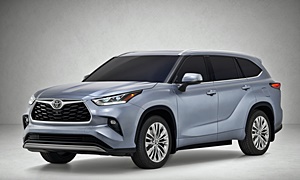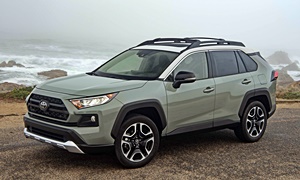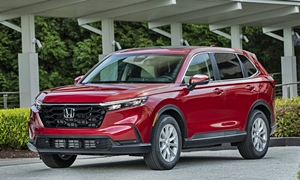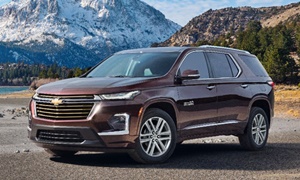Except if you get a small SUV, minivans get the same or better gas mileage as the midsized SUVs like Highlander, Pilot, and Sorento. Buying another Sienna or a Honda Odyssey might be a good idea. You won't find many (or any) active safety features in your price point. Just ESC, which is still helpful.
From the cars on your list I suggest the Toyota Highlander and RAV4. The Mitsubishi is a tinny car and no one knows how much longer they will be around, no one buys them. Mitsubishi isn't well recieved in America right now, but they do have a good warranty. The Ford CMax is unreliable (and isn't it smaller than a Prius interior wise?). The previous gen 2011-2015 Kia Sorento was also unreliable. Hyundai/Kia had a class action lawsuit about their 2.4L engines failing. They recalled it but engines are still failing after the fix. The V6 also has problems of its own with no recall. The most occuring problems are the driver's door not opening and the sunroof randomly exploding and shattering glass over the people inside. Also, transmission failure was common. Doesn't sound too good. The new Sorento is really good though.
The 2008 Highlander had problems with the electronic speed control (which is very dangerous) but 2009 and newer fixed the issue completely. Other than that it has been one of the most reliable cars on the road. It was a nice SUV that drove like a Lexus. Fuel efficiency is not a strong point though, except with the hybrid. This would be my top suggestion.
My mother in law drives a 2014 RAV4. She likes it a lot. Gets pretty good MPGs. Comfortable, relatively quiet and has a nice list of standard features with a modern interior. I like the 2013-2017 RAV4 more than the 2012-2016 CR-V.
I own a 2005 Prius I put 247k miles on and it still runs perfectly. I also bought a new 2016 Prius early last year. Such an improvement from the previous generations. I have always thought the Prius V was a practical car, but when I drove it, it was slower than my 2005. That's saying something. It was also as tinny feeling as my 2005. Cheaper interior and louder cabin. I was impressed with the feature list though and the MPGs for such a big car. Aside from the engine noise it rode comfortably, but it is still a night and day difference compared to the 2016-2017 Prius liftback. I thought the trunk was pretty big and think of the gas you'll save. $
The 2013 Honda CR-V was a reliable, efficient, and comfortable CUV. Only problem is it has lots of road noise.
A key to getting past 200k miles is not buying a turbocharged car. Those things are expensive to replace. Of course researching helps too. Good luck and respond to tell us what you buy!
| 2 |







